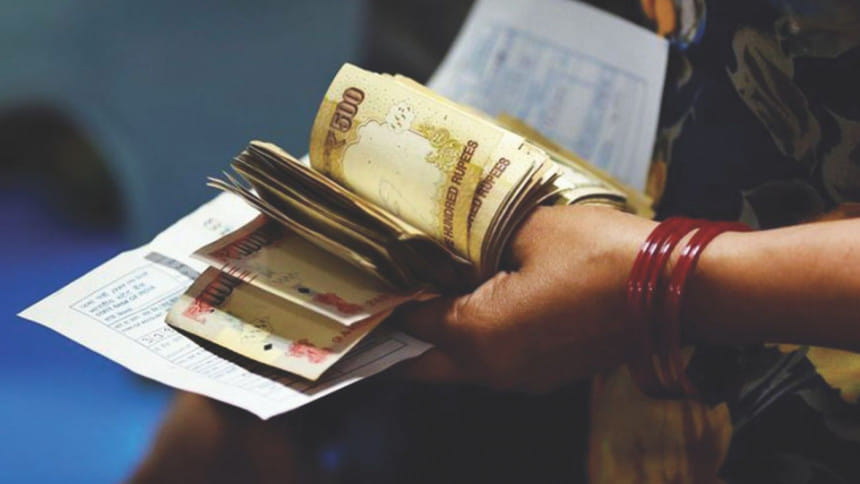Modi's war on blackmoney

Midway Through his tenure, Prime Minister Narendra Modi has declared war against blackmoney holders. On November 8 he declared Indian currency notes of Rs 500 and Rs 1000 denomination were no longer legal tenders. People across India were panicked by this government move.
There were apparently several objectives for Modi to take this sudden drastic step – boost government revenue, crackdown on rampant tax evasion, curb illegal financial transactions, stamp out terrorism, and thwart black money holders from converting it into gold or any other physical asset. The "revolutionary" step is expected to suck out 86 percent value of Rs17.8 trillion in circulation.
Chaotic serpentine lines of people are seen in front of banks across India waiting to exchange their demonetised notes with new notes of Rs 500 and Rs 2000 issued by the Reserve Bank of India (RBI). Modi said it was an act of "purifying" the economy. India is a cash-driven country and money becomes black when tax payable against it is not paid.
Old notes up to Rs 4000 can be exchanged for new notes at banks or post offices, if one does not have a bank account. Bank account holders can deposit any amount in their accounts, but can withdraw only upto a maximum of Rs 20,000 per week. Those depositing Rs 250,000 or above will come under the Income Tax Department scanner. If tax evasion is detected the account holder will have to pay the tax assessed plus a hefty penalty of 200 percent of the tax payable. Thumbs of individuals who exchanged expired cash were marked with indelible ink so that they cannot reappear to change again.
Modi's move has revealed some baffling facts. Some estimates put the black economy at 40 percent of India's vast economy of over USD 2.0 trillion GDP (2015). In India 85 percent of people do not have bank accounts and 90 percent of transactions are done in cash. Real estate dealers are notorious dealing mostly in huge amounts of cash to avoid paying tax. Businessmen needing foreign exchange to import goods also resort to illegal transactions. Huge amounts of cash are illegally funnelled to voters during state and national elections. Rich women convert their husbands' illegal earnings into gold jewellery. Terrorist and smugglers use large notes. Cash bribes are always in large notes and people have tendency to stash their savings in cash in big notes under the mattress.
The demonetisation process will extinguish wealth held in those notes if it is not exchanged or deposited in banks by December 31, 2016. If it comes overboard then the government stands to rake in additional USD 45 billion in revenue. It will enlarge the income tax base in a country of 1.25 billion people, where only 3 percent pay income tax.
Indian opposition parties have come out with severe criticism of the government move. Delhi CM Arvind Kejriwal alleged that during the past three months thousands of crores of rupees were deposited in banks. This according to Kejriwal was done by BJP members who had black money and knew about the demonetisation scheme. He alleged that the real black money was in Swiss banksheld by Indians. Modi promised to bring that back but did nothing. Congress leader Rahul Gandhi criticising the government said "There is no crorepati in the queue". Mamata Banerjee called for withdrawing "this draconian decision". Opposition parties are up in arms in the Lok Sabha criticising BJP for messing up the lives of the poor people.
The Supreme Court of India also stepped in directing the government to take steps to ensure that the common man was not burdened by its decision. "Discontinuing of higher denomination notes appears to be carpet bombing and not surgical strike," the bench said.
Economic experts welcomed the attack on black money but said that the current demonetisation would not be very successful as the old notes are being exchanged for new ones. In the short run there would be some contraction of money supply but soon the supply would become normal. There may be a negative effect on economic growth. The immediate positive effect of demonetisation will be lower inflation in the economy which currently stands at 4.4 percent. However, worries are also there that if the money supply is not restored quickly there may be deflationary effect on the economy. Prices of consumer durables, cars, land, agricultural products, etc. will fall.
Further unscrupulous hawala agents may find ways to make more black money by charging fat commissions to change old notes for new ones. Besides, the new Rs 2000 note may not find takers as it cannot be converted into smaller denominations easily. These may land into the coffers of hoarders.
Economists say to totally snuff out black money from the economy all major financial transactions need to be done through banks and not in cash. But that is impossible in a developing country like India. Voluntary disclosure of income rewarded with incentives is probablya better strategy of converting black money into white.
It is a nightmare for RBI as it tries to replace old notes with new ones and keep track of income tax dodgers. While tax payers have welcomed the exercise, the sufferers have been the middle and lower income groups who are not income tax assessees, do not have bank accounts and keep liquid cash to run their daily lives.
Modi however, has asked people to be patient and referring to his "chai-wallah" days said, "My justice is little karak (strong)". Will Modi's war on corruption bring "Acchhe Deen" (good days) to the people of India?
The writer is a former Ambassador and Secretary.

 For all latest news, follow The Daily Star's Google News channel.
For all latest news, follow The Daily Star's Google News channel. 



Comments